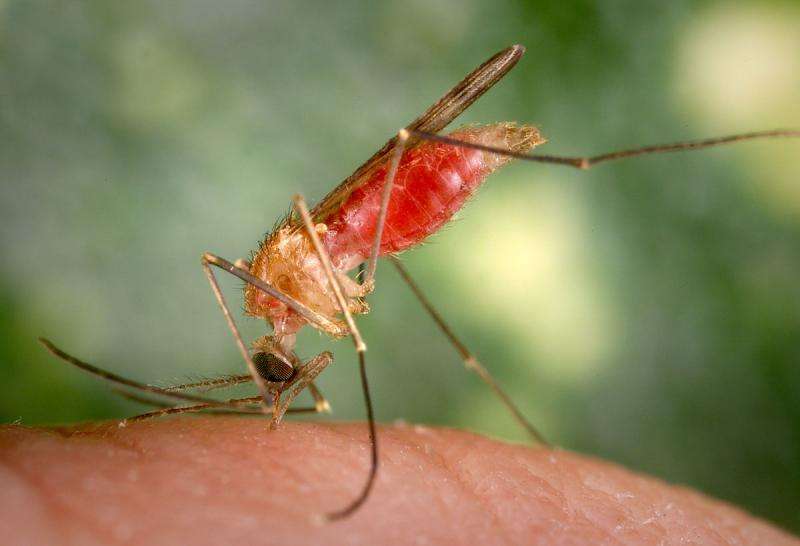Study looks at ecological traps to minimize human risk of mosquito-borne pathogens

Ecological traps have the potential to effectively control pest species and inhibit the spread of infectious diseases, according to a University of Maine researcher.
A recently published study led by Allison Gardner, an assistant professor of arthropod vector biology at UMaine, provides new insights into how ecological traps, which occur when organisms show preference for low-quality habitats over other available high-quality sites, happen in nature and a proof-of-concept for an attract-and-kill tool for mosquito control.
Mosquito-borne diseases exact a toll on human health around the world. Adult mosquito abundance is considered among the most important predictors of humans' exposure to mosquito-borne pathogens, according to Gardner.
Within recent decades, mosquito management strategies that rely exclusively on insecticide use in aquatic larval habitats have fallen short, Gardner says, due to the evolution of insecticide resistance in mosquitoes, impacts of insecticides on other species, and perceived and actual risks regarding the environmental and public health safety of insecticides.
"The abundance of mosquitoes in aquatic habitats and the efficacy of conventional insecticides for juvenile mosquito control are strongly influenced by variables such as rainfall, water chemistry, and the species and structure of terrestrial vegetation in the surrounding environment," Gardner says. "This suggests that ecologically based strategies could complement insecticide use for environmentally safe and sustainable mosquito abatement."
In an article published in the Proceedings of the Royal Society B, Gardner explores the use of ecological traps to control mosquitoes. "Discovery and exploitation of a natural ecological trap for a mosquito disease vector" was co-written by Ephantus Muturi, a research entomologist with the United States Department of Agriculture's Crop Bioprotection Research Unit, and Brian Allan, an associate professor of entomology at the University of Illinois at Urbana-Champaign.
The mechanisms generating ecological traps could provide tools for creating traps that are more effective in controlling pest species compared to conventional approaches such as insecticide use. The attract-and-kill concept has been used for decades to control agricultural and forest pests but remains underexplored for mosquitoes, the researchers say.
The team's previous research identified leaf litter from common blackberry as a natural ecological trap for Culex pipiens, a species of mosquito that transmits West Nile virus in the United States. The leaf litter attracts mosquitoes, causing them to lay eggs in habitats that are detrimental to the survival of their larvae.
In the study, the team demonstrated that manipulation of leaf litter in stormwater catch basins, which provide important breeding grounds for mosquito disease vectors in urban environments, can increase the rate in which Cx. pipiens lay eggs, or oviposit, but reduce survival.
A series of experiments suggests that oviposition site selection by Cx. pipiens is mediated primarily by chemical cues as leaves decompose. However, the study also shows that juvenile mosquito survival mainly is related to the suitability of the bacterial community in the aquatic habitat for mosquito nutritional needs, which does not appear to create a cue that influences oviposition choice.
The mismatch between oviposition cues and drivers of larval habitat quality may account for the ecological trap phenomenon detected in the study, according to the researchers.
The findings demonstrate that certain leaf litter types offer potential for the development of novel mosquito control strategies. Results suggest mosquito abatement may be enhanced by using oviposition attractants to lure females to lay eggs in habitats unsuitable to the survival of larvae, potentially increasing the effectiveness of control efforts by wasting female production and reducing juvenile survival.
The researchers recommend future research to assess the duration of success of leaf litter-derived attractants and toxins, including whether the ecological trap treatment continues to attract mosquitoes and whether its detrimental effect may diminish over time, as well as potential dose-dependence of the attractant properties of leaf detritus.
More information: Allison M. Gardner et al. Discovery and exploitation of a natural ecological trap for a mosquito disease vector, Proceedings of the Royal Society B: Biological Sciences (2018). DOI: 10.1098/rspb.2018.1962
Journal information: Proceedings of the Royal Society B
Provided by University of Maine



















